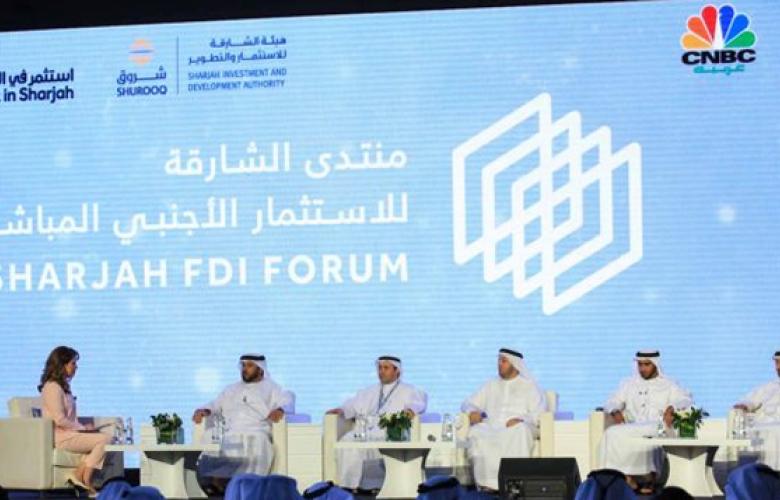Sharjah FDI 2017 propels the UAE’s entrepreneurial economy to help new businesses take off
Sharjah FDI 2017 propels the UAE’s entrepreneurial economy to help new businesses take off
The forum focussed on Sharjah's economy, business start-ups and the UAE’s forthcoming Value Added Tax (VAT) imposition.
The Sharjah FDI 2017 (foreign direct investment) two-day global investment forum was held under the patronage of His Highness Dr. Sheikh Sultan bin Muhammad Al Qasimi, Supreme Council Member Ruler of Sharjah. The forum was held at the Jawaher Reception and Convention Centre, and was organised by Sharjah Investment and Development Authority (Shurooq) and Sharjah FDI Office (Invest in Sharjah), in conjunction with CNBC Arabia.
This year’s forum, attended by more than 1,500 corporate business leaders, public sector representatives and government officials from the region and beyond, was themed ‘The Fourth Industrial Revolution,’ and focussed on the economy, business start-ups and the UAE’s forthcoming Value Added Tax (VAT) imposition.
At a glance:
- The two-day Sharjah FDI 2017 global investment forum was held last week
- 1,500 corporate business leaders, public sector representatives and government officials attended
- The discussions focussed on the economy, business start-ups and the Value Added Tax imposition
- The conference concluded that every country can be globally competitive with the changes that The Fourth Industrial Revolution was throwing up
- Also, countries need to develop regulations in partnership with the private sector
- Sharjah’s The Fourth Industrial Revolution will capitalise on the changing industrial landscape
Moderator Mohamed from CNBC Arabiya, said “I am standing before you now because I chose to take a position with a smaller company. The man that was to become my boss told me that I would learn much more and grow far more quickly with a dynamic operation that was going places. I took his advice and have never looked back. Start-ups can accelerate your career growth.”
Two leading taxation experts gave their opinion that despite UAE Government help, many businesses are ‘panicking’ and will not make the January 1, 2018 deadline, when discussing the imminent arrival of VAT in the UAE.
Read about how How the UAE’s new VAT will affect the property sector here.
“The government has done a fantastic job in trying to assist again and again, but we are just 100 days away from this tax and I would estimate that only 40% of businesses are ready. Some companies have made a lot of effort, but because there has been a tax free environment for so long, there is a certain ambivalence – ‘we’ll worry about it in January’, which is obviously not workable,” said Gurdeep Singh Randhay, Director and Head of Tax at Grant Thornton.
Marc Collonette, Indirect Tax Manager for Deloitte Middle East said “Individual businesses must decide whether they want to absorb some of those charges to make them more competitive and while there are certain sectors that will be exempt, such as healthcare and education the decisions ultimately lie with the businesses themselves. The Ministry of Finance has covered many, many sessions to help companies set up the VAT changes, and these adjustments should already have been in place, but to a large extent they are not, despite the fact that 90% of VAT law around the world is the same – it’s generic.”
His Excellency Marwan bin Jassim Al Sarkal, CEO of Shurooq, outlined the three takeaways he had gleaned from the conference; firstly, that every country can be globally competitive thanks to the transformative changes that The Fourth Industrial Revolution was throwing up. Secondly that to benefit fully from these changes countries need to develop regulations with the regulatory framework best established in partnership with the private sector. Thirdly, that Sharjah takes very seriously the issue of The Fourth Industrial Revolution and was ready to capitalise on what is a rapidly changing industrial landscape.
“Sharjah is ready to embrace the future and the future is contained within The Fourth Industrial Revolution. We look forward to working with our partners across the UAE - both in the private sector and public sphere - to create the right environment for businesses to take off and thrive in this new and exciting landscape,” he said.
See also:
Cluttons reports rising demand for villas in affordable, family-friendly Sharjah
Foster + Partners to transform Sharjah landfill with new sustainable masterplan




